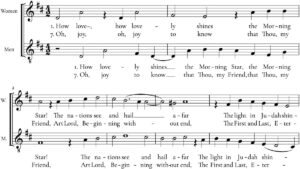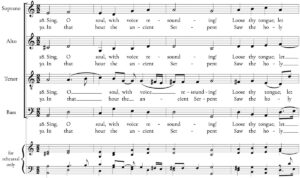
Samuel Scheidt was born in November of 1587 in Halle, Germany, the firstborn of Konrad Schiedt and Anna Achtmann. Scheidt’s earliest musical influences were the cantors Matthaeus Birkner and Georg Schetz, and when he was 17 years old he became the organist at the Moritzkirche in Halle. He had the opportunity to further his musical studies through a journey to Amsterdam, where he stayed two years to learn from Jan Pieterszoon Sweelinck (1562-1621).
Scheidt returned to Halle in 1609 to become the court organist of Margrave Christian Wilhelm of Brandenburg, a role that resulted in his lifelong involvement in the music of Halle. During this time in 1614, Samuel Scheidt met Michael Praetorius, who was given an honorary position in the court. In 1618 when there was a series of concerts in Magdeburg, Scheidt, Praetorius, and Heinrich Schütz were all present to provide music. Doubtless the music made from the collaboration of these three great Lutheran musicians was breathtaking. In 1627, during the Thirty Years’ War, Scheidt married Helena Magdalena Keller, and they had seven children, four of whom tragically died of the plague in 1636. Despite the ravages of war and disease, Scheidt continued to compose and teach, with Adam Krieger being a notable student of his. He died in Halle on Good Friday, March 24, 1654.
Scheidt is remembered as the father of German organ music, especially because of his innovations in organ tablature, the method at the time for writing organ scores. He also composed choral music including motets, larger polychoral concertos, and smaller concertos for voices and instruments. Both his organ and choral works frequently employ Lutheran chorales as their cantus firmus, and Scheidt states of his compositional style that “I stick to the pure old compositions and standards.” Some of his more notable works are Cantiones Sacrae (1620), a collection of German and Latin texts for a double chorus; Tabulatura Nova (1624), a three-part volume of organ works; Newe geistliche Concerten (1635/1640), a series of many chorales arranged for small ensembles of singers and instrumentalists; and Tabulaturbuch, 100 geistliche Lieder und Psalmen, which contains one hundred chorale-based works for organ arranged according to the church year.
Quote from Scheidt’s Letter to Baryphonus in 1651, quoted on p. 145 in Music in Early Lutheranism by Carl Schalk.



Arrangements by Samuel Scheidt

How Lovely Shines the Morning Star, á 2
“How Lovely Shines the Morning Star” (Wie schön leuchtet der Morgenstern), text by Philipp Nicolai (1597). Tune by Philipp Nicolai (1599). Setting by Michael Praetorius (1610). Polyphonic, ST.

How Lovely Shines the Morning Star, á 5
“How Lovely Shines the Morning Star” (Wie schön leuchtet der Morgenstern), text by Philipp Nicolai (1597). Tune by Philipp Nicolai (1599). Setting by Michael Praetorius (1610). Polyphonic, SATTB.

Hymn for All Hours
“Hymn for All Hours” (Hymnus Omnis Horae), text by Aurelius Clemens Prudentius (348-c.413). Tune traditional Latin. Setting by Michael Praetorius (Hymnodia Sionia 28, 1611). Polyphonic, SATB.

Lo, How a Rose E’er Blooming
“Lo, How a Rose E’er Blooming” (Es ist ein Ros entsprungen), text German (16th cent.). Tune and setting by Michael Praetorius. Homophonic, SATB.

Lord, Keep Us Steadfast in Your Word
“Lord, Keep Us Steadfast in Your Word” (Erhalt uns, Herr), text by Martin Luther. Setting by Michael Praetorius. Polyphonic, SAB.

Rejoice, Rejoice, Believers
“Rejoice, Rejoice, Believers” (Ermuntert euch, ihr Frommen), text by Laurentius Laurenti (c. 1700). Tune (Freut euch, ihr lieben Christen) by Leonhart Schröter (1587). Setting by Michael Praetorius (1609). Homophonic, SATB.

